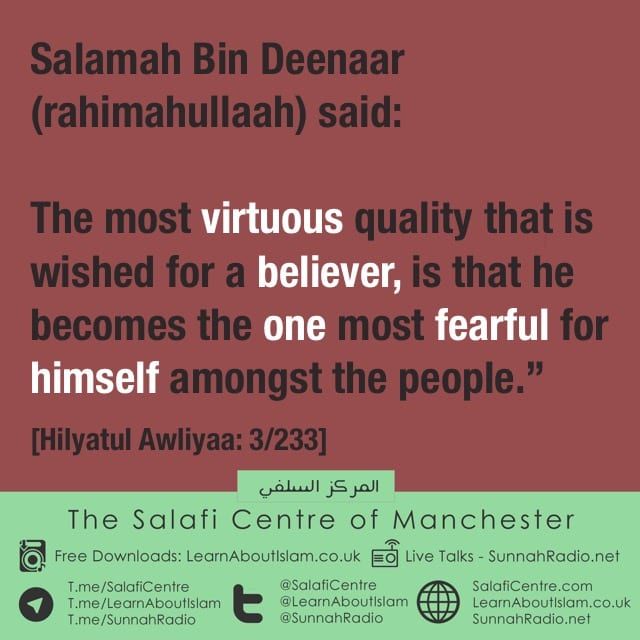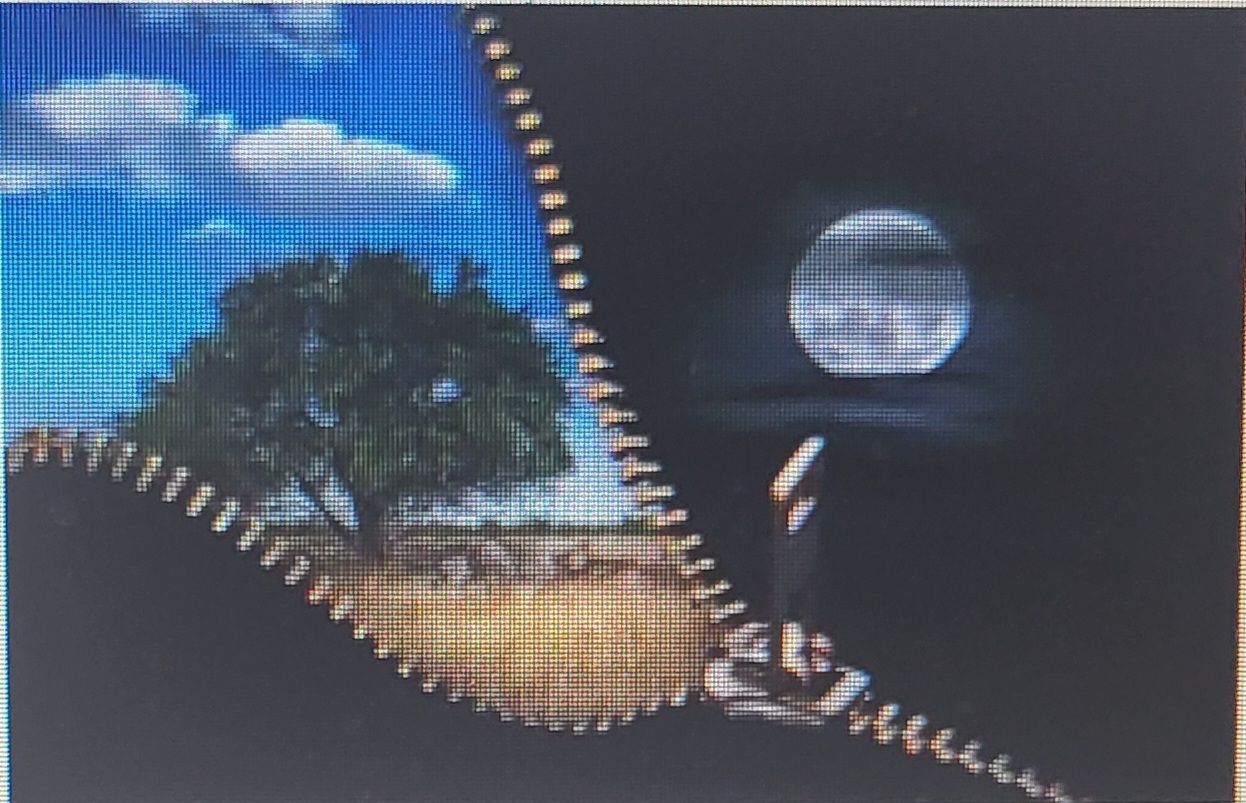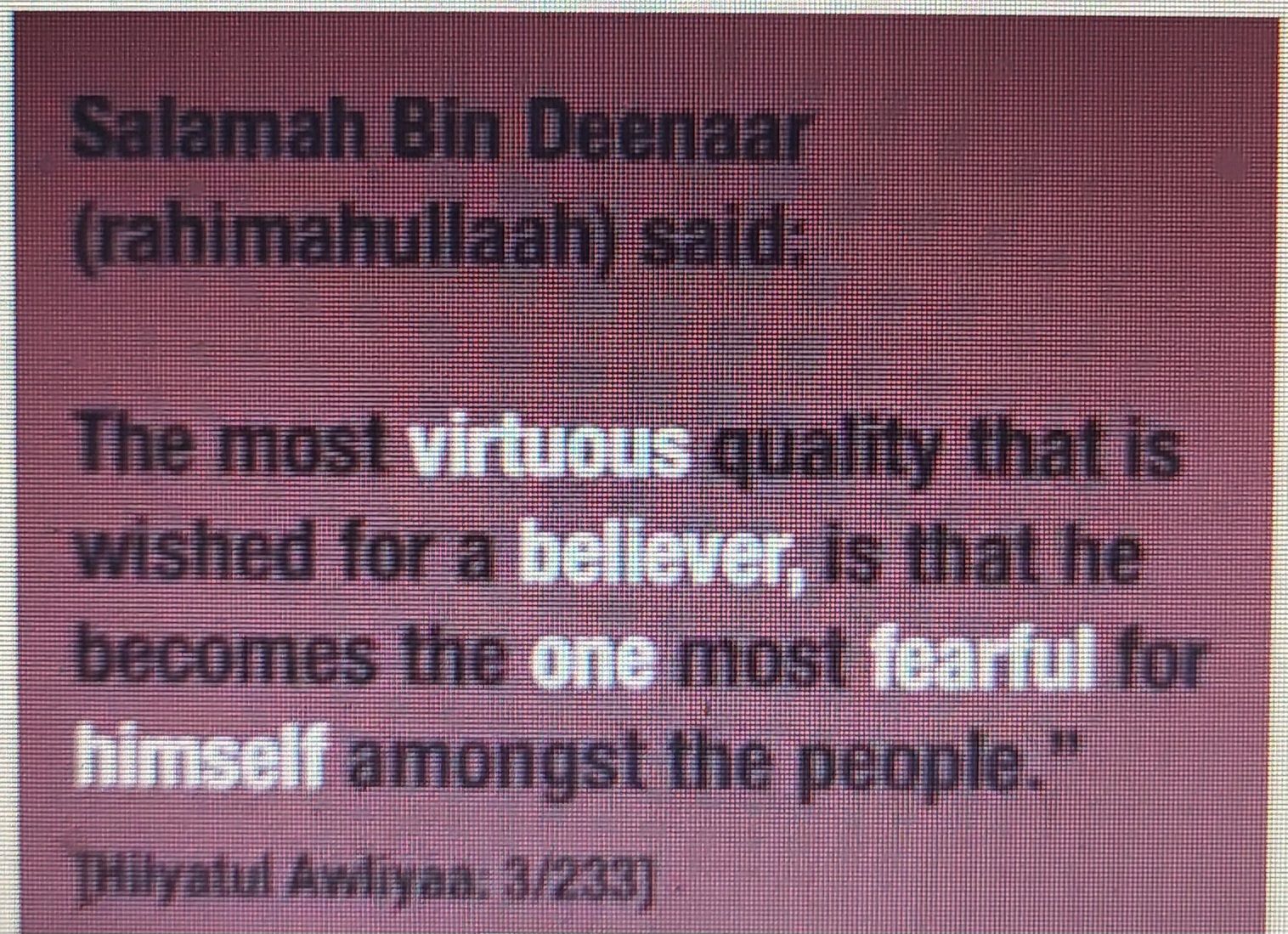Arabic text: weakness_part3
Imam Abdul Aziz Bin Baz – may Allah have mercy upon him- continued…..
When we know the disease, which is evident and apparent, just as we know the prevalence of ignorance, the lack of pursuit of knowledge and understanding of religion, turning away from the knowledge of the Shariah, the contentment with worldly sciences that merely serve as qualifications for employment, albeit feeble and inadequate sciences that only equip individuals for work within their country and state, rather than pursuing knowledge that would render us self-sufficient and not reliant on the enemies and failing to fulfil the command of Allah and avoid His displeasure, then it becomes obligatory to address the disease through the knowledge of the Shariah. This is because only a few people pay attention to the beneficial knowledge conveyed by the Prophet, peace and blessings of Allah be upon him, and only a few people prepare against the enemies so that the people and the state can attain independence from them. The disease is evident and apparent, encompassing several remedies for the issues that have emerged, such as ignorance, turning away from the religion, and being heedless until the fear of death arose, and worldly given precedence and (became) more desirable, Jihad became a frightening specter appealing to only a few people, the objective shifted from upholding the word of Allah to pursuing nationalism, patriotism, or other objectives unrelated to the elevation of Allah’s word, instead of manifesting one’s religion and eradicating anything that opposes it.
Apart from what Allah wills (to remain in terms of strength, adherence to the religion, etc), the preparation is feeble or non-existent, and the objectives are misguided. Thus, the path to success and advancement in confronting the enemies, the absence of weakness, the path to prosperity and success, reaching high positions and noble aspirations, and prevailing over enemies, all lies in seeking beneficial knowledge, and pursuing understanding in the religion, prioritising Allah’s pleasure over His wrath, fulfilling obligations, avoiding prohibitions, sincerely repenting for past sins and shortcomings, complete cooperation between the state and the people in obeying Allah and His Messenger, refraining from what is forbidden, and preparing oneself as Allah says:
وَأَعِدُّوا لَهُمْ مَا اسْتَطَعْتُمْ مِنْ قُوَّةٍ
“And prepare against them whatever you are able of power” [Al-Anfal 60]
There must be physical and material preparation, as well as preparation in all other aspects so that we can depend on what Allah has bestowed upon us rather than what our enemies possess. It is very difficult to confront our enemies with what they possess. And if the enemy prevents you from acquiring weapons, what will you fight with, (especially when) coupled with weak insight and lack of knowledge? Therefore, it is crucial to prepare to the best of our abilities, and it would be enough as long as Muslims strive not to rely on their enemies, engage in Jihad against them, and safeguard their nations, with the intention of establishing Allah’s command and seeking the hereafter as much as possible. This is because Allah says:
وَأَعِدُّوا لَهُمْ مَا اسْتَطَعْتُمْ مِنْ قُوَّةٍ
“And prepare against them whatever you are able of power”.
Allah did did not say “And prepare against them like their power” because this may not be possible.
If the Muslims are truthful, unite, and prepare as much as they can against their enemies, and support the religion ordained by Allah, then Allah will help and grant them victory, exalted be He. He will place them in front of their enemies and above their enemies, not beneath them. Allah says, and He is truthful in His words and promises:
يَٰٓأَيُّهَا ٱلَّذِينَ ءَامَنُوٓا۟ إِن تَنصُرُوا۟ ٱللَّهَ يَنصُرْكُمْ وَيُثَبِّتْ أَقْدَامَكُمْ
O you who believe, if you aid (the cause of) Allāh, He will aid you (against your enemy) and make your foothold firm (upon faith and upon the straight path and against your enemy). https://www.thenoblequran.com/q/#/search/47_7
Allah is not powerless or in need of people, but He tests His righteous servants with the wicked, to make known between the truthful and the liars, the ones who strive in His path and others, otherwise, He is capable of supporting His allies and destroying His enemies without war, without the need for Jihad, preparation, and other means, as He says:
ذَلِكَ وَلَوْ يَشَاءُ اللَّهُ لانْتَصَرَ مِنْهُمْ وَلَكِنْ لِيَبْلُوَ بَعْضَكُمْ بِبَعْضٍ
That (is what you are commanded) and if Allāh had so willed, He could have punished (and destroyed) them (without you). But (He commanded you to fight against them) in order to test some of you with others. https://www.thenoblequran.com/q/#/verse/47/4
In Surah Al-Anfal, Allah says regarding the story of the battle of Badr:
[وَمَا جَعَلَهُ اللَّهُ إِلا بُشْرَى وَلِتَطْمَئِنَّ بِهِ قُلُوبُكُمْ – Allah made it only as glad tidings, and that your hearts be at rest therewith. [Al-Anfal. 10]
This means that He provided them with reinforcements from the angels. Allah says:
وَمَا ٱلنَّصْرُ إِلَّا مِنْ عِندِ ٱللَّهِ إِنَّ ٱللَّهَ عَزِيزٌ حَكِيمٌ
And there is no victory except from Allah. Verily, Allah is All-Mighty, All-Wise.
Similarly, in a verse from Surah Al-Imran, Allah says:
وَمَا جَعَلَهُ ٱللَّهُ إِلَّا بُشْرَىٰ لَكُمْ وَلِتَطْمَئِنَّ قُلُوبُكُم بِهِۦ وَمَا ٱلنَّصْرُ إِلَّا مِنْ عِندِ ٱللَّهِ ٱلْعَزِيزِ ٱلْحَكِيمِ
Allah made it not but as a message of good news for you and as an assurance to your hearts. And there is no victory except from Allah, the All-Mighty, the All-Wise. [Aal Imran. 126]
Therefore, victory is from Him, the Almighty and Wise, but He, glorified be He, sends reinforcements through the angels, the provision of weapons, wealth, and a large number of troops are all reasons for victory, good tidings, and reassurance. However, victory is not solely dependent on these factors. Allah, glorified be He, says:
كَمْ مِنْ فِئَةٍ قَلِيلَةٍ غَلَبَتْ فِئَةً كَثِيرَةً بِإِذْنِ اللَّهِ وَاللَّهُ مَعَ الصَّابِرِينَ
“How often a small group overcame a mighty host by Allah’s Leave?” And Allah is with As-Sabirin (the patient ones, etc.). [Al-Baqarah. 249]
At the Battle of Badr, they were three hundred and thirteen, with little weaponry and riding animals. It is well-known that they possessed seventy camels, which they took turns riding. Their arsenal was meagre, with only two horses among them. On the other hand, the disbelievers’ army numbered around a thousand, equipped with immense power and numerous weapons. However, when Allah desired their defeat, He vanquished them, rendering their strength and soldiers useless. Despite their feeble forces, Allah defeated the thousand with the three hundred and thirteen. Through the facilitation, victory, and support of Allah, they emerged victorious, capturing seventy disbelievers and eliminating seventy others, while the remaining disbelievers were defeated. All of this is from Allah’s signs and His aid. On the day of the Confederates, the disbelievers embarked upon a military expedition against the city of Madina with ten thousand fighters from various Arab tribes including the Quraysh and others. They besieged the city and the Prophet dug the trench, which was one of the reasons for the decisive victory. They stayed for a while besieging the city, and then Allah removed them without any fighting. He instilled fear in their hearts and unleashed winds and hosts upon them until they had no choice but to retreat defeated to their lands. All of this was from Allah’s aid and assistance, Glorified and Exalted is He. Then they were abandoned and did not attack the Prophet in Madina, rather he attacked them on the day of Hudaybiyyah, and the famous treaty was concluded. Then he attacked them in the eighth year in Ramadan and Allah opened Makkah for him. After that, people entered into the religion in large numbers.
The intended message is that Allah, the Exalted, holds the key to victory and serves as the protector of His followers. However, Allah, the Exalted, has prescribed certain means to attain victory, with the most significant being obedience to Allah and His Messenger. A crucial aspect of this obedience is that you acquire knowledge and understanding of the religion so that you are acquainted with Allah’s Judgement and His Shariah in the context of Jihad against your enemy, in preparing yourself for your enemy, in refraining from engaging in what Allah has prohibited, in fulfilling the obligations set by Allah, in adhering to the boundaries established by Allah, in collaborating with fellow Muslims, in offering valuable contributions from oneself and one’s wealth in the cause of Allah, and in supporting the religion ordained by Allah and elevating His word, and not merely (doing so) for a specific country or nationality.
This is the way and the path to victory over the enemies for the leader, the subjects, the elder, and the youth, through religious education and understanding of the religion ordained by Allah. Then, acting accordingly and abandoning what we are doing that Allah has forbidden. Allah says:
إِنَّ اللَّهَ لا يُغَيِّرُ مَا بِقَوْمٍ حَتَّى يُغَيِّرُوا مَا بِأَنْفُسِهِمْ
“Indeed, Allah will not change the condition of a people until they change what is in themselves” [Ar-Ra’d: 11]
Therefore, whoever wants victory, support, and the elevation of Allah’s word must change what they are doing in terms of sins and disobedience that is in opposition to Allah’s command. Your Lord, Exalted and glorified be He, says:
وَعَدَ اللَّهُ الَّذِينَ آمَنُوا مِنْكُمْ وَعَمِلُوا الصَّالِحَاتِ لَيَسْتَخْلِفَنَّهُمْ فِي الْأَرْضِ كَمَا اسْتَخْلَفَ الَّذِينَ مِنْ قَبْلِهِمْ وَلَيُمَكِّنَنَّ لَهُمْ دِينَهُمُ الَّذِي ارْتَضَى لَهُمْ وَلَيُبَدِّلَنَّهُمْ مِنْ بَعْدِ خَوْفِهِمْ أَمْنًا يَعْبُدُونَنِي لا يُشْرِكُونَ بِي شَيْئًا
Allah has promised those among you who believe, and do righteous good deeds, that He will certainly grant them succession to (the present rulers) in the earth, as He granted it to those before them, and that He will grant them the authority to practice their religion, that which He has chosen for them (i.e. Islam). And He will surely give them in exchange a safe security after their fear (provided) they (believers) worship Me and do not associate anything (in worship) with Me. But whoever disbelieved after this, they are the Fasiqun (rebellious, disobedient to Allah). [An-Nur. 55]
Allah did not say: “Allah has promised those who are affiliated with Quraysh or Arabs or those who build palaces and extract petroleum… etc., but rather linked the promise to sincere faith and righteous deeds whether they are Arabs or non-Arabs.
These are the factors for victory and succession on earth, not Arabism or non-Arabism, but rather sincere faith in Allah and His Messenger and righteous deeds. This is the reason, the condition, and the axis around which it revolves. Whoever adheres to it will have empowerment, succession on earth, and victory over enemies. Whoever deviates from that is not guaranteed victory, safety, or honour; rather, a disbeliever may triumph over another disbeliever, a criminal over another criminal, or a hypocrite over another hypocrite. However, the guaranteed victory promised by Allah to His believing servants over their enemies is only achieved through the conditions set by Him, and the qualities He has clarified, which are sincere faith and righteous deeds. This is how the religion of Allah is victorious, as He has says:
وَلَيَنْصُرَنَّ اللَّهُ مَنْ يَنْصُرُهُ إِنَّ اللَّهَ لَقَوِيٌّ عَزِيزٌ
الَّذِينَ إِنْ مَكَّنَّاهُمْ فِي الْأَرْضِ أَقَامُوا الصَّلاةَ وَآتَوُا الزَّكَاةَ وَأَمَرُوا بِالْمَعْرُوفِ وَنَهَوْا عَنِ الْمُنْكَرِ
Verily, Allah will help those who help His (Cause). Truly, Allah is All-Strong, All-Mighty. Those (Muslim rulers) who, if We give them power in the land, (they) order for Iqamat-as-Salat. [i.e. to perform the five compulsory congregational Salat (prayers) (the males in mosques)], to pay the Zakat and they enjoin Al-Ma’ruf (i.e. Islamic Monotheism and all that Islam orders one to do), and forbid Al-Munkar (i.e. disbelief, polytheism and all that Islam has forbidden) [i.e. they make the Quran as the law of their country in all the spheres of life]. And with Allah rests the end of (all) matters (of creatures). [Al-Hajj. 40-41]
This is the victory of the religion ordained by Allah. Whoever enjoins what is good and forbids what is evil has indeed achieved the victory of the religion ordained by Allah. This includes fulfilling the obligations set by Allah and abstaining from what Allah has prohibited. And Allah, the Most High, says:
كُنْتُمْ خَيْرَ أُمَّةٍ أُخْرِجَتْ لِلنَّاسِ تَأْمُرُونَ بِالْمَعْرُوفِ وَتَنْهَوْنَ عَنِ الْمُنْكَرِ وَتُؤْمِنُونَ بِاللَّهِ
You [true believers in Islamic Monotheism, and real followers of Prophet Muhammad SAW and his Sunnah (legal ways, etc.)] are the best of peoples ever raised up for mankind; you enjoin Al-Ma’ruf (i.e. Islamic Monotheism and all that Islam has ordained) and forbid Al-Munkar (polytheism, disbelief, and all that Islam has forbidden), and you believe in Allah. [Aal Imran 110]
And He, Glorified be He, says:
وَلْتَكُنْ مِنْكُمْ أُمَّةٌ يَدْعُونَ إِلَى الْخَيْرِ وَيَأْمُرُونَ بِالْمَعْرُوفِ وَيَنْهَوْنَ عَنِ الْمُنْكَرِ وَأُولَئِكَ هُمُ الْمُفْلِحُونَ
Let there arise out of you a group of people inviting to all that is good (Islam), enjoining Al-Ma’ruf (i.e. Islamic Monotheism and all that Islam orders one to do) and forbidding Al-Munkar (polytheism and disbelief and all that Islam has forbidden). And it is they who are the successful. [Aal Imran 104]
The righteous who are to receive success, support, and a praiseworthy outcome are those who do good deeds, enjoin what is good, forbid what is evil, establish prayer, give charity, and aid Allah’s cause. They are the ones mentioned in the verse:
وَكَانَ حَقًّا عَلَيْنَا نَصْرُ الْمُؤْمِنِينَ
“And (as for) the believers it was incumbent upon Us to help (them). [Ar-Rum. 47]
The cure is clear and the treatment is evident, but where are those who seek the cure? Where are those who seek the treatment? And where are those who apply it?!
This is the obligation of the rulers, the scholars, and the influential and important personalities everywhere, and in all Islamic countries if they are sincere in calling to Islam; by establishing prayer, giving zakat, preserving that, enjoining good, forbidding evil, pursuing understanding in the religion, reforming curricula in schools at all levels, and also cooperating in unity against enemies and uniting with sincerity to Allah in work and truthfulness in it, and intending the Hereafter. By doing so, they deserve victory from Allah and His support, as our righteous predecessors did, which is not hidden from the people of knowledge. Just yesterday, when the reviver of the signposts of Islam in the twelfth century witnessed the great ignorance, the nullification of rulings of the Shariah, the abundance of ignorance in the peninsula and elsewhere, the scarcity of callers to Allah, and the division of the people of this peninsula into small states without guidance and knowledge, he believed (or saw) that it was his duty to call people to Allah, to warn them of the dangers they faced, and to strive to unite them on the truth under one leader who would establish the command of Allah among them. So, he diligently worked towards this goal, calling people to Allah, contacting rulers, writing letters about pure Islamic monotheism and the implementation of Allah’s law, and the abandonment of polytheism. He did not cease being patient and steadfast in his mission, seeking reward from Allah after studying and gaining knowledge of religion from scholars. He then focused on calling people to Allah and Jihad, starting in Huraymila, then Al-Aynah, before moving to Diriyah where he pledged allegiance to Muhammad Bin Saud for jihad and establishing the command of Allah. They all believed in this cause, united, and fought against their weaknesses until Allah granted them victory. They proclaimed pure Islamic monotheism, called people to truth and guidance, and implemented Allah’s law among His servants. Due to their sincerity, reliance on Allah, and good intentions, Allah supported and aided them, and their stories are known to many with even the slightest insight.
Then, after the period of stagnation and division that occurred, King Abdulaziz, may Allah have mercy on him, emerged and took charge of this matter with diligence and zeal. He sought the help of Allah and then turned to the people of knowledge, faith, and insight. Allah supported and aided him, and united for him the word of the Muslims in this peninsula on one word, upon judging by Allah’s Shariah and Jihad in the cause of Allah, until its affair was straightened, thus this peninsula (from its north to its south, east, and west) united on truth and guidance with the means of truthfulness, Jihad, and elevation of the word of Allah – the Exalted. The point is that there are many examples of that. Similarly, Salah al-Din al-Ayyubi’s story is well-known, as is that of Mahmud Zanki. The point is that our righteous predecessors, due to being truthful in their jihad during the time of their Prophet and afterward, Allah honoured them and elevated their status. They conquered the two great kingdoms – the Persian and the Roman Kingdom in the Levant and its surroundings. Then, those who followed them in the religion ordained by Allah, Allah granted them victory due to their sincerity and unity in upholding the word of Allah. Subsequently, at various times, individuals emerged with truthfulness and what they possessed of sincerity, so Allah supported and helped them against their enemies according to their level of sincerity, striving, and sacrifice.
The Almighty, Allah, is the one who granted victory to the early and later believers. He is the one who supports those who aid His cause and forsakes those who forsake Him, as Allah says:
أَلَيْسَ اللَّهُ بِكَافٍ عَبْدَهُ
“Is not Allah sufficient for His Servant?” [Az-Zumar: 36]
And He, glorified be He, says:
وَإِنْ تَصْبِرُوا وَتَتَّقُوا لا يَضُرُّكُمْ كَيْدُهُمْ شَيْئًا
“And if you are patient and fear Allah, their plot will not harm you at all.” [Aal-Imran. 120]
And the Almighty says:
كَمْ مِنْ فِئَةٍ قَلِيلَةٍ غَلَبَتْ فِئَةً كَثِيرَةً بِإِذْنِ اللَّهِ وَاللَّهُ مَعَ الصَّابِرِينَ
“How often a small group overcame a mighty host by Allah’s Leave?” And Allah is with As-Sabirin (the patient ones, etc.). [Al-Baqarah: 249]
However, the calamity is due to our own doings as Allah -The Almighty says:
وَمَا أَصَابَكُمْ مِنْ مُصِيبَةٍ فَبِمَا كَسَبَتْ أَيْدِيكُمْ وَيَعْفُو عَنْ كَثِيرٍ
“And whatever misfortune befalls you, it is because of what your hands have earned. And He pardons much.” [Ash-Shurah 30].
The calamity occurred from the Muslims’ weakness, laziness, ignorance, seeking immediate gains, love of the worldly life (at the expense of one’s religious well-being), fear of death, neglecting Allah’s commands, forsaking the prayers, following desires, prioritising worldly life, engaging in forbidden acts, listening to obscene songs, and corrupters of the hearts and morals… and so on. Allah, allowed the Muslims to be overcome by their enemies through this and similar circumstances, as He says:
وَإِذَا أَرَدْنَا أَنْ نُهْلِكَ قَرْيَةً أَمَرْنَا مُتْرَفِيهَا فَفَسَقُوا فِيهَا فَحَقَّ عَلَيْهَا الْقَوْلُ فَدَمَّرْنَاهَا تَدْمِيرًا
And when We decide to destroy a town (population), We (first) send a definite order (to obey Allah and be righteous) to those among them [or We (first) increase in number those of its population] who are given the good things of this life. Then, they transgress therein, and thus the word (of torment) is justified against it (them). Then We destroy it with complete destruction. [Al-Israa. 16]
We ask Allah- The Almighty- to favour us and all Muslims and their leaders with repentance and adherence to His commandments, cooperation in righteousness and piety, and preparation against our enemies with the necessary things, the pursuit of understanding in the religion, patience in following what is pleasing to Him and distance from His displeasure. We also ask Him, the Exalted, to protect us all from all the pitfalls of trials and tribulations, and the causes of His wrath, and to support the religion He has ordained and elevate His word; frustrate His enemies and unite the Muslims upon truth and guidance. May He rectify the affairs of our leaders and grant them insight. Truly, He is All-Hearer, Ever Near (to all things by His perfect knowledge).
May Allah send salutations (of peace and blessings upon) our master Muhammad, his family, and companions.
The End
Source: Majmoo Fataawaa Wa Maqaalaat Shaikh Ibn Baz 5/101
We welcome your feedback to enhance this translation.
I ask Allah to bless my beloved Salafi brother, bosom buddy, and colleague Ustaadh Abu Tasneem Mushaf Al-Banghali for recommending the translation of this article.
Read the article by Shaikh Abu Khadeejah transmitted from Al-Allamah Salih Al-Fawzan:
Salafi Shaikh Fawzaan on Jihad in our times and the guidelines of Jihad according to Islam








